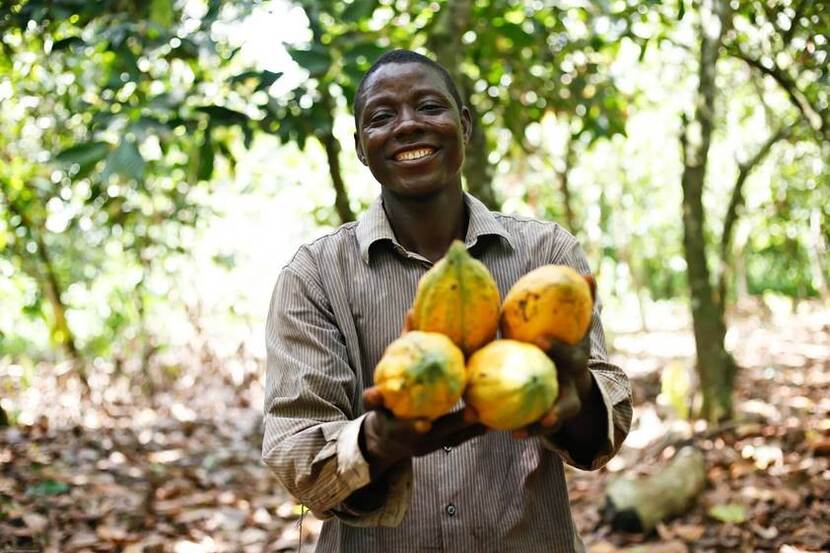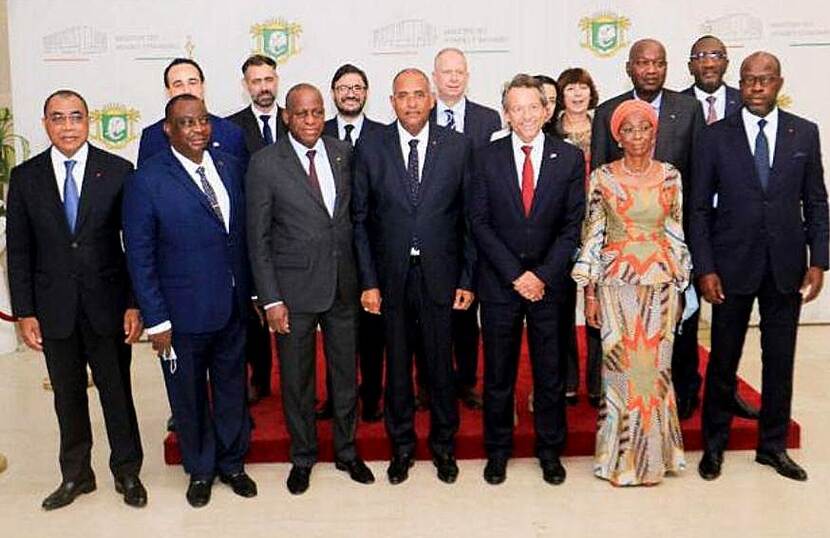EU's Team Europe Initiative - Sustainable Cocoa in Côte d'Ivoire
Côte d'Ivoire and Cocoa
As a reminder, Côte d'Ivoire is the largest producer of cocoa in the world (45% of world production with more than 2.2 million tonnes) and the European Union is its first buyer (67% of Ivorian cocoa is exported to the EU). Amsterdam is obviously the entry point and The Netherlands is thus the biggest importer of cocoa in the world. Cocoa plays a strategic role in the economic and social development of Cote d’Ivoire and the sector represents about 14% of the Gross Domestic Product. From this economic reality stems a relationship of mutual interest that both partners want to see continued.
However, cocoa production in Côte d'Ivoire faces three major challenges, which are deforestation, the phenomenon of child labor in cocoa cultivation and improving the income of producers. Indeed, Cote d’Ivoire has lost 80% of its forest cover, 54% of farmers live below the poverty line. To this must be added the persistence of the worst forms of child labor.
The EU Market
European citizens are increasingly concerned about environmental and social issues. In accordance with the political priorities of the European Commission, including the Green Deal and the zero tolerance approach to child labor, European citizens and governments are now committed to contributing to the progressive transformation of production methods and consumption. In cocoa, this desire is reflected in the establishment national initiatives and platforms. In the Netherlands we have the Dutch Initiative on Sustainable Cocoa. They work closely together with GISCO for Germany, Beyond-Chocolate in Belgium and SWISCO from Switzerland. The European Parliament, Commission and Council are currently working on legislative proposals to support the sustainability of the cocoa sector; the first legislative proposal aims to minimize the risk of deforestation and forest degradation associated with products placed on the EU market. The second proposal concerns the Corporate Social Responsibility which will aim to make obligatory the duty of vigilance (Due Diligence) in terms of human rights for European companies.

The Ivorian Actions
In view of the difficulties of the sector, the Ivorian government has undertaken actions for several years to fight against deforestation, child labor and the poverty of producers. Among these actions, we note the establishment of a monitoring structure for actions to combat child labor, the establishment, with the support of Ghana, of the living income differential. and a forestry strategy. To date, these initiatives still need to be integrated into a comprehensive national strategy. This strategy must have the objectives of making an inventory of (i) relevant Ivorian legislation, (ii) the action program of the State and stakeholders, (iii) the resources mobilized and to be mobilized, (iv) the results achieved and future prospects as part of improving the sustainability of cocoa production.
Ivorian and European Cooperation
The convergence of interests between the Ivorian government and member states through the European Union delegation in Abidjan has given rise to a political dialogue on sustainable cocoa. This political dialogue is a will of the two parties to strengthen their compatible and complementary actions. This favorable context led to the establishment of a common initiative of all member states around sustainable cocoa called "Team Europe Initiative - TEI". The aim of this initiative is the structural transformation of the cocoa value chain in the Cote d’Ivoire with regard to the challenges of markets and economic, social and environmental sustainability. Thus, through the TEI accompanied by financial support, the European Union plans to support the implementation of the national strategy. Côte d'Ivoire, a key player in the reform, expects € 1 billion from the European Union over four years to improve the sustainability of its cocoa sector.
The specific objectives of the TEI are (1) to achieve the transition towards a sustainable cocoa economy in Côte d'Ivoire, (2) to support the private sector, including cocoa farmers and cooperatives, to develop innovative agricultural practices, (3 ) promote respect for human and children's rights, and (4) improve the governance of the sector and transparency in the management of the sector. The initiative will actually start at the end of 2021.

The involvement of the Netherlands in the Team Europe Initiative
The involvement of the Netherlands is found on two levels. At the level of Cote d'Ivoire, the Dutch Embassy in Abidjan and LNV are actively participating in the discussions and have made significant contributions to the concept note of the project with the support of DDE, DISCO, and IDH. Likewise, at European level, the Netherlands shone through their interventions during the cocoa-talk. All of these initiatives aim to promote and share the Dutch expertise acquired over the years through initiatives led by IDH, Solidaridad, Agriterra, Rainforest Alliance, etc in the cocoa sector.
The Netherlands Government Agricultural team in West Africa is available to assist you in Advancing you agribusiness interest in Côte d'Ivoire
Landbouwteam, Ghana, Ivoorkust en Nigeria
E-mail: ACC-LNV@minbuza.nl
Twitter: @Agri_WestAfrica